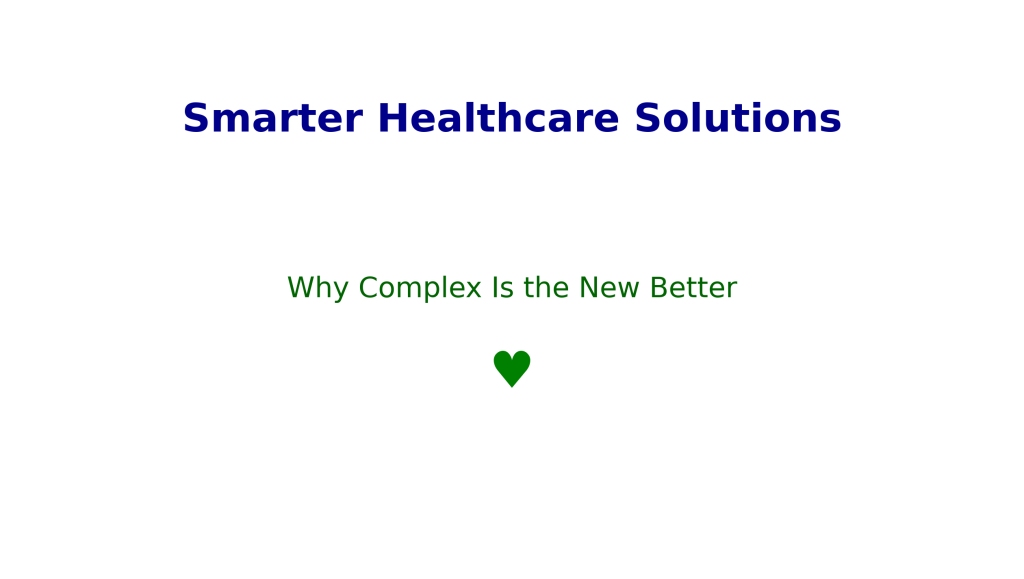We’ve all been told that simpler is better, but in many areas of life, the “simplest” solution may not always be the most effective. Nowhere is this more true than in healthcare. Recent advancements show that sometimes, adding complexity—through smart technologies, innovative treatments, and personalized plans—can lead to far better results. If you’re tired of outdated healthcare approaches and looking for smarter, more effective solutions, keep reading.

The Emergence of Smarter Healthcare Solutions
The phrase “simpler isn’t always easier” has become increasingly relevant in healthcare. Traditional healthcare models, while seemingly straightforward, are often inefficient or unable to address the complexities of modern health challenges. From robotic surgeries to AI-powered diagnostics, today’s most effective medical solutions are anything but simple. However, they are smarter—and that’s what truly matters.
1. Robotic Surgery: Precision Over Simplicity
Robotic-assisted surgery is a prime example of a technology that defies the notion that simpler is better. Unlike traditional open surgeries that can be invasive and require long recovery times, robotic surgeries are minimally invasive, offering unparalleled precision. These advanced systems, such as the da Vinci Surgical System, allow surgeons to make smaller incisions, reducing pain and speeding up recovery.
Moreover, the enhanced accuracy and ability to perform complex procedures have made robotic surgery an attractive option for patients. The technology, while complex, has been proven to lead to better outcomes, including fewer complications, shorter hospital stays, and faster recovery times.
2. Telemedicine: Not Just Convenient—But Smarter
Telemedicine is a game-changer in the healthcare industry, especially after the COVID-19 pandemic. While initially perceived as a simpler alternative to in-person visits, it quickly became clear that telemedicine isn’t just about convenience—it’s a smarter way to manage healthcare. Virtual appointments allow patients to access healthcare remotely, saving time and reducing the burden on healthcare facilities.
But the real innovation comes in the form of smart telemedicine solutions. AI-powered health apps now allow for more accurate symptom tracking, and some platforms even incorporate machine learning to provide personalized treatment recommendations. These advancements make telemedicine not just easier but smarter—offering better healthcare management at your fingertips.
3. AI-Driven Diagnostics: Efficiency and Accuracy
AI-powered diagnostics are reshaping the way doctors approach patient care. Simple tests like blood pressure readings or temperature measurements are no longer sufficient to diagnose complex conditions. AI is making diagnostics more precise by analyzing large datasets to identify patterns that might be missed by the human eye.
For instance, IBM Watson Health is leveraging artificial intelligence to provide insights into cancer diagnoses, suggesting potential treatment options based on an individual’s medical history and genetic makeup. While this process is far from simple, it results in smarter, more accurate diagnostics, which are crucial for improving patient outcomes.
4. Personalized Medicine: Smarter Than One-Size-Fits-All
Personalized medicine is another example where complexity leads to better outcomes. Traditional medicine often uses a one-size-fits-all approach, where treatments are prescribed based on average patient data. However, personalized medicine uses genetic, environmental, and lifestyle factors to tailor treatments to each individual, enhancing effectiveness and minimizing side effects.
Through genomics and advanced data analysis, doctors can prescribe treatments that are uniquely suited to a patient’s genetic profile. This personalized approach is revolutionizing the treatment of conditions like cancer, diabetes, and even mental health disorders, making it clear that smarter healthcare leads to better results.
Why Smarter Healthcare is the Future
As healthcare continues to evolve, the focus is shifting from simplicity to intelligence. While simpler solutions may be easier to implement, they often fail to address the nuanced needs of modern patients. Smarter healthcare systems, though more complex, are equipped to handle the growing demand for personalized, efficient, and effective care.
By embracing complexity, healthcare professionals and patients alike can access the most advanced technologies that lead to better health outcomes. Whether it’s robotic surgery, AI diagnostics, or telemedicine, the future of healthcare is smarter—not simpler.
Conclusion
The next time you hear that simpler is better, remember that smarter solutions are often what truly move the needle in healthcare. These smarter systems are not only more efficient but also more effective, offering personalized and accurate care that can revolutionize the way we think about health. Don’t settle for simple solutions—embrace smarter, more advanced healthcare.
References
- Ashbourn, J. (2014) Biometrics in the new world: the cloud mobile technology and pervasive identity. Available at: https://www.springer.com (Accessed: 26 June 2025).
- Thomas, D., & Tian, L. (2021) Hits from the Bong: the impact of recreational marijuana dispensaries on property values. Available at: https://www.journals.elsevier.com (Accessed: 26 June 2025).
- Gulddal, J. (2020) That deep underground savage instinct: narratives of sacrifice and retribution in Agatha Christie’s Appointment with Death. Available at: https://www.tandfonline.com (Accessed: 26 June 2025).






